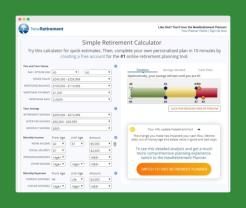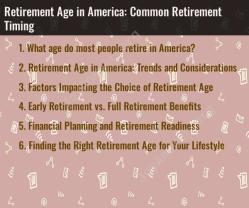What are the Best Retirement calculators?
Several retirement calculators are available online to help individuals estimate their future retirement needs and plan accordingly. The effectiveness of a retirement calculator can depend on its features, ease of use, and the accuracy of the underlying assumptions. Here are some popular and well-regarded retirement calculators:
Fidelity Retirement Score:
- Fidelity's Retirement Score tool allows users to assess their retirement readiness. It considers factors such as savings, investment strategy, and retirement age to provide a score indicating how well-prepared you are for retirement.
Vanguard Retirement Nest Egg Calculator:
- Vanguard's calculator helps users estimate the future value of their retirement savings. It considers variables such as savings rate, expected retirement age, and investment returns.
T. Rowe Price Retirement Income Calculator:
- T. Rowe Price's tool is designed to estimate how long your savings will last in retirement. It considers factors such as current savings, planned withdrawals, and expected investment returns.
Personal Capital Retirement Planner:
- Personal Capital offers a comprehensive retirement planner that considers your current financial situation, expected retirement age, savings, and spending goals. It also integrates with other financial accounts for a holistic view.
NewRetirement Retirement Calculator:
- NewRetirement provides a detailed retirement calculator that allows users to input various financial details, including savings, pensions, Social Security, and expenses. It provides a comprehensive analysis and allows for scenario planning.
ESPlanner:
- ESPlanner (Economic Security Planner) takes a comprehensive approach to retirement planning. It considers lifetime spending goals, taxes, and insurance to provide a detailed plan for achieving financial security in retirement.
AARP Retirement Calculator:
- The AARP retirement calculator is user-friendly and helps individuals estimate their retirement savings needs. It considers factors such as current savings, expected Social Security benefits, and desired retirement age.
Bankrate Retirement Calculator:
- Bankrate offers a simple yet effective retirement calculator. Users can input details such as savings, expected returns, and retirement age to estimate future savings and income needs.
SmartAsset Retirement Calculator:
- SmartAsset's retirement calculator takes a detailed approach, considering factors such as Social Security, pensions, and other sources of income. It provides a comprehensive analysis of your retirement plan.
NerdWallet Retirement Calculator:
- NerdWallet offers a retirement calculator that considers savings, expected retirement age, and lifestyle goals. It provides a personalized savings target and guidance on achieving it.
When using these calculators, it's important to input accurate and realistic information for the most meaningful results. Additionally, keep in mind that these calculators are tools for estimation and planning, and they make various assumptions about investment returns, inflation, and other factors. Regularly reassess your retirement plan and adjust it based on changes in your financial situation or goals. Consulting with a financial advisor can provide personalized insights and guidance based on your unique circumstances.
Choosing the Right Retirement Calculator: Navigating the Financial Horizon
Retirement calculators provide valuable tools for estimating your financial needs and planning for a secure future. But with so many options available, choosing the right one can seem daunting. Here's how to identify the best retirement calculators for your situation:
1. Key Criteria for Selecting a Retirement Calculator:
- Accuracy and Credibility: Look for calculators backed by reputable financial institutions, government agencies, or academic institutions with strong methodologies for calculating retirement needs.
- Customization Options: Choose a calculator that allows you to input your specific financial situation, including income, savings, investments, desired retirement age, and lifestyle goals.
- Detailed Output: Opt for calculators that provide not just a single number but also offer breakdowns of projected expenses, income sources, investment returns, and potential shortfalls or surpluses.
- Consideration of Inflation: Ensure the calculator factors in inflation and adjusts future costs accordingly for a realistic picture of your needs.
- Sensitivity analysis: Look for calculators that let you change variables and see how they impact your retirement outcome, allowing you to explore different scenarios and make informed decisions.
2. Benefits of Using Retirement Calculators:
- Estimating Future Needs: These tools help you understand how much you need to save and invest to maintain your desired lifestyle in retirement.
- Identifying Potential Shortfalls: Early awareness of any potential gaps between your income and expenses allows you to adjust your savings goals, adjust your retirement age, or explore additional income sources.
- Comparing Scenarios: Testing different retirement ages, investment returns, and spending patterns lets you evaluate various options and make informed decisions about your future.
- Motivating Action: Seeing the realistic numbers can motivate you to stay on track with your saving and investment plan, promoting financial discipline and achieving your retirement goals.
3. Specific Features and Factors to Consider:
- Taxation: Does the calculator consider how taxes will impact your income and investment returns in retirement?
- Healthcare Costs: Can you input specific estimates for medical expenses and long-term care needs?
- Social Security benefits: Does the calculator factor in your expected Social Security benefits based on your earnings history?
- Inheritance or windfalls: Can you account for potential inheritances or other windfalls in your calculations?
- Investment options: Does the calculator allow you to specify your investment strategy and risk tolerance?
Remember: While retirement calculators are valuable tools, they are not foolproof. They offer estimates based on certain assumptions and should not be solely relied upon for financial decisions. Consulting a financial advisor can provide personalized guidance and help you navigate the complexities of retirement planning.
By considering these criteria, features, and factors, you can choose a retirement calculator that best suits your needs and empowers you to plan for a financially secure and fulfilling future.
I hope this information helps! Feel free to ask any further questions you may have about retirement calculators or financial planning.











